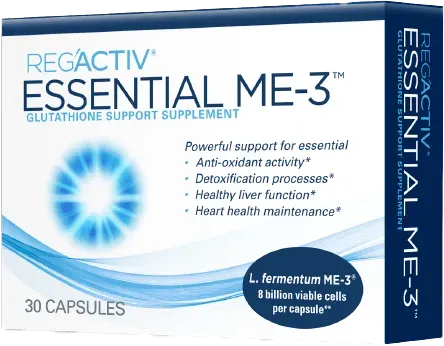THE IMPORTANCE OF GLUTATHIONE and Lactobacillus fermentum ME-3: A Glutathione-Producing Probiotic Bacteria

Glutathione is a crucial molecule in the human body, yet it is often overlooked because it cannot be effectively taken orally as a supplement. Glutathione is produced in every cell and is known as the Master Antioxidant and Master Detox Agent. Its primary function is to protect cellular components from free radical damage. Remarkably, it safeguards more of the body than all other antioxidants combined. Additionally, glutathione regenerates other oxidized antioxidants like vitamin C, vitamin E, and coenzyme Q10, restoring them to their active forms.
Glutathione is vital for nearly all detoxification processes in the body. Over the past 50 years, exposure to environmental toxins has increased dramatically, depleting glutathione levels. This depletion leads to a higher body burden of toxins, increased free radical damage, and accelerated aging. Maintaining optimal glutathione levels is therefore essential for healthy aging. On average, after age 20, the body's ability to synthesize glutathione declines by about 1% per year, contributing to the acceleration of health problems with age.
Glutathione is a tripeptide composed of three amino acids: glutamate, cysteine, and glycine. However, it is ineffective when taken orally as it gets broken down before absorption. Various common exposures deplete glutathione levels, including alcohol, artificial sweeteners, tobacco smoke, acetaminophen, toxic metals like mercury, artificial food dyes, agricultural pesticides and herbicides, and many household chemicals. Additionally, the nutritionally deficient diet of many Americans further contributes to low glutathione levels.
Every system in the body is influenced by glutathione levels, particularly the immune, nervous, gastrointestinal, respiratory, and hepatic systems. Some nutritional supplements, such as N-acetyl cysteine, selenium, and lipoic acid, as well as the herb milk thistle, can help boost glutathione levels. Some companies also market oral glutathione supplements in liposomal delivery forms, which improve absorption but still result in rapid oxidation. Intravenous glutathione administration provides a short-term solution, but it is neither time-efficient nor costeffective for most people.

Revolutionary Breakthrough: Lactobacillus fermentum ME-3
A unique strain of probiotic bacteria, Lactobacillus fermentum ME-3 (ME-3), has been found to synthesize glutathione. Discovered in the intestinal tract of a healthy one-year-old child in 1995, ME-3 exhibits high antioxidant activity. For nearly three decades, scientists have studied ME-3 to understand its antioxidant effects.
A Complete Glutathione System
Scientists have identified that ME-3 boosts glutathione levels through three independent mechanisms: synthesizing glutathione, extracting it from the environment, and regenerating oxidized glutathione. ME-3 is the only known organism capable of boosting glutathione levels by all three mechanisms simultaneously, earning it the title of a Complete Glutathione System.
Human Clinical Trials
Human clinical trials with Lactobacillus fermentum ME-3 have shown promising results: a 16% reduction in LDL cholesterol, 20% reduction in 8-isoprostanes, 49% increase in reduced glutathione, 26% increase in total antioxidant activity.
In addition to producing glutathione, ME-3 provides several other health benefits. It produces manganese superoxide dismutase (Mn-SOD), another critical antioxidant enzyme, offering substantial protection against free radical damage. Boosting glutathione levels is one of the most important actions for promoting and maintaining good health. Previously, there was no effective method to achieve this. Now, products containing Lactobacillus fermentum ME-3 offer a significant increase in glutathione levels, resulting in improved detoxification, enhanced protection against free radicals, and healthier aging.










